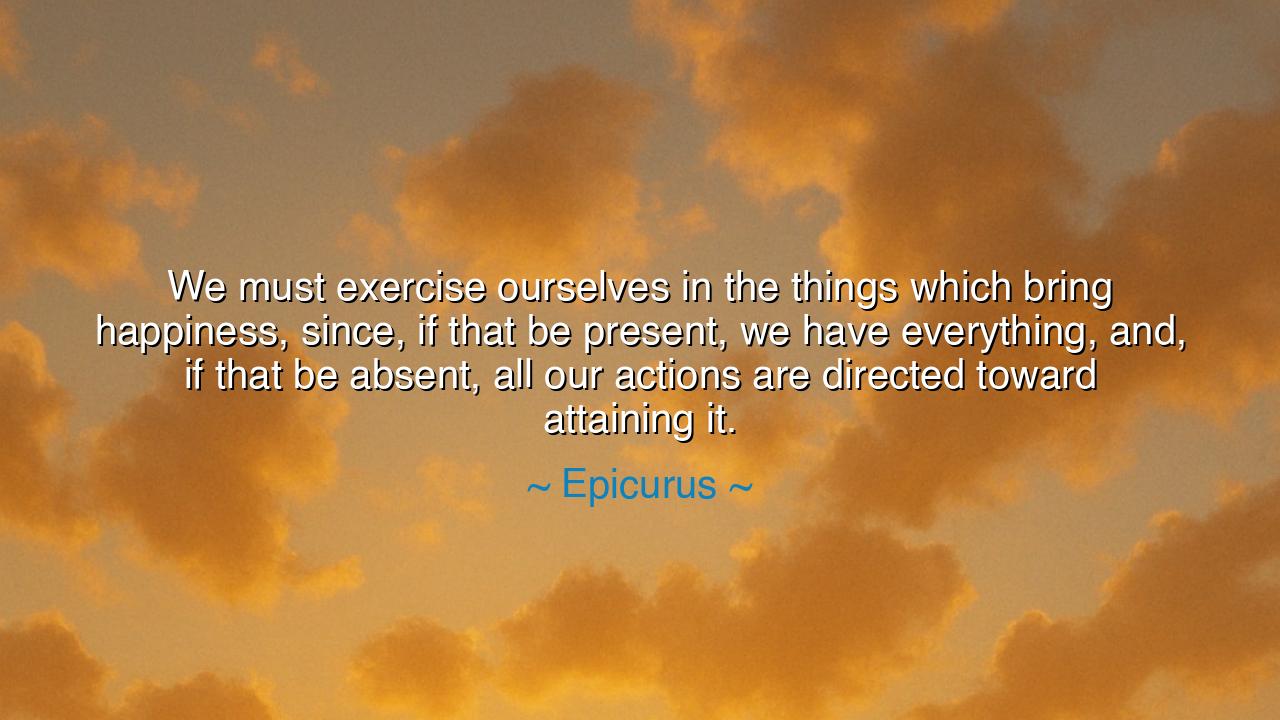
We must exercise ourselves in the things which bring happiness
We must exercise ourselves in the things which bring happiness, since, if that be present, we have everything, and, if that be absent, all our actions are directed toward attaining it.






“We must exercise ourselves in the things which bring happiness, since, if that be present, we have everything, and, if that be absent, all our actions are directed toward attaining it.” Thus wrote Epicurus, the philosopher of peace and moderation, who sought to teach humankind that true happiness is neither the fruit of chance nor the gift of the gods, but the result of discipline, reflection, and practice. In these immortal words, he declares that happiness is both the highest good and the most necessary labor of the soul. For when happiness is present, life is complete; but when it is absent, every deed, every struggle, and every longing becomes an attempt to recover it. Therefore, the wise do not leave their joy to fate — they exercise the art of happiness daily, as an athlete trains his body for strength and grace.
The origin of this saying lies in the teachings of Epicurus, founder of the school known as the Garden in Athens, around the third century before the birth of Christ. Unlike the cold logic of the Stoics or the restless ambition of statesmen, Epicurus taught a gentler path — the cultivation of inner peace through moderation, friendship, and gratitude. He believed that happiness was not found in wealth or power, but in freedom from unnecessary pain and fear. To achieve it, he urged men and women to exercise their minds — to think clearly about what truly brings contentment and to cast aside the vain desires that lead to turmoil. Thus, happiness was not a fleeting pleasure, but a skill — a way of living that must be practiced, nourished, and guarded like a sacred flame.
“We must exercise ourselves,” he says — for happiness does not come to those who wait idly for fortune’s favor. Just as the body grows weak without motion, so too does the spirit decay without the practice of virtue and awareness. Epicurus knew that many chase after pleasure blindly, thinking happiness lies in excess — in the feast, the gold, the applause of the crowd. Yet such pursuits leave the soul weary and empty. The exercise of happiness is not indulgence but discipline: the art of finding sufficiency in simplicity, joy in understanding, and peace in the quiet mastery of one’s desires. It is not the roaring fire of passion, but the steady warmth of a hearth that sustains through every season.
Consider the example of Marcus Aurelius, the Roman emperor and philosopher. Though surrounded by riches and honor, he often wrote in his meditations that contentment was not given by empire, but earned through harmony of the soul. Each morning, he reminded himself that his duty was not to seek pleasure, but to live rightly — to act justly, to think clearly, to love humbly. In this daily exercise, he found the serenity that power alone could never grant. He discovered, as Epicurus taught centuries before, that happiness arises not from the world’s approval, but from the disciplined alignment of one’s heart with wisdom and truth.
In this way, Epicurus was not a preacher of indulgence, as many have falsely claimed, but a guide to freedom. He warned that those who chase happiness without wisdom become slaves to their own desires. They are like wanderers chasing a mirage, forever thirsty, forever deceived. But the one who exercises happiness — who trains the soul through gratitude, reflection, and temperance — drinks deeply from the well of contentment. Such a person is rich though poor, peaceful though surrounded by storms, for they have mastered the art of needing little and appreciating much.
The philosopher’s words also carry a subtle but powerful truth: that all our actions are in some way directed toward happiness. Even the greedy and the cruel seek, through their misguided paths, what they believe will bring them peace. Every ambition, every desire, every struggle — whether noble or corrupt — arises from the same root: the longing for contentment. But only those who understand the nature of true happiness will find it. For it is not in the possession of things, but in the possession of oneself. It is not in the satisfaction of every want, but in the wisdom to discern which wants are worthy of pursuit.
Therefore, my children, take these words of Epicurus as both a challenge and a comfort: “We must exercise ourselves in the things which bring happiness.” Do not wait for happiness to appear like a passing wind; cultivate it like a garden. Reflect each day on what brings peace to your soul, and practice it. Be grateful for small blessings, for gratitude multiplies joy. Choose moderation over excess, for simplicity is the mother of contentment. And seek friendship, wisdom, and kindness — for these are the pillars of lasting happiness.
And remember this eternal truth: when happiness is present, nothing is lacking; when it is absent, all else is in vain. Therefore, make happiness not your wish, but your work. Exercise it daily, faithfully, as the ancients exercised their bodies for strength. For the one who trains the heart to be at peace becomes unshakable — rich not in gold, but in grace, and content not for a moment, but for a lifetime.






AAdministratorAdministrator
Welcome, honored guests. Please leave a comment, we will respond soon